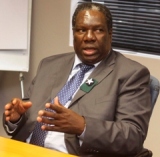
CITATION FOR VUSI MAHLASELA: HONORARY GRADUAND, 5 APRIL 2013
By Professor Paul Maylam
He is known quite simply as ‘The Voice’, and one of his songs, ‘When You Come Back’, is widely considered a South African classic, something akin to a national anthem. Vusi Mahlasela, our honorary graduand, is indeed renowned for his powerful voice, and for his poetic, stirring lyrics.
A musician from his childhood, perhaps even infancy – Vusi says he’s sure he learnt to sing before he could talk – growing up in Mamelodi where he was raised by his grandmother who ran a shebeen, where he heard men singing ‘ingombabusuku’, songs of the night.
His first guitar he made himself – out of fishing line and a cooking oil can – and taught himself to play – later taking guitar lessons, paid for by Nobel Laureate writer, Nadine Gordimer. At school he amazed his teachers with his marvellous vocal range, singing in many school productions and forming a vocal group of his own.
Here too was a budding song-writer. Tired of singing cover versions of popular songs he began to compose his own music and lyrics, then joining a group of poets, musicians and actors, who went under the name, ‘Ancestors of Africa’.
The formative years of this brilliant musical career fell, of course, during the late apartheid era, characterised as it was by heavy state repression. As a ten-year-old he witnessed the brutal killing of school learners during the 1976 uprising. So he became politicised and his songs political – songs of struggle, freedom, justice – songs sung at political rallies and cultural events, as his reputation soared. With this came constant police harassment and eventual imprisonment. Not deterred or cowed, he continued to compose – some of his songs written on pieces of toilet paper while in solitary confinement.
As the apartheid era ended in the 1990s, so did Vusi’s musical career take off. His first album appeared in 1992. The title track, ‘When You Come Back’, was a song for his friends and exiles who had left the country – ‘we will ring the bells and beat the drums when you come back’ – lyrics of celebration and hope. Two years later he sang this song at Nelson Mandela’s presidential inauguration.
Growing international prominence followed for Vusi – in 2002 featuring in Lee Hirsch’s acclaimed documentary on the role of music in the anti-apartheid struggle; in 2005 contributing six songs to the soundtrack of the award-winning movie, ‘Tsotsi’; performing at Mandela’s 90th birthday concert in Hyde Park, London in 2008; ringing in the 2010 World Cup Kick-off Concert at the Orlando Stadium with a stirring rendition of ‘When You Come Back’.
In the meantime there had been shows across the world – in Belgium, the US, Ivory Coast, Zimbabwe, Namibia, Zambia, Sweden, France, Germany, Austria, Finland, Denmark, the Tribute to Princess Diana Concert in England, the South African leg of Live Earth in 2007 – along the way sharing the stage with the likes of the Dave Matthews Band, Sting, Paul Simon, Ladysmith Black Mambazo, Hugh Masekela, Angelique Kidjo, Amos Lee, and many others.
There are seven Vusi Mahlasela studio albums released in South Africa, and most recently a live recording of a concert held at the Lyric Theatre in Johannesburg last year, recently released under the title, ‘Sing to the People’.
Vusi’s music is a blend of genres – combining folk, jazz, soul, Mbaqanga, and marabi. Quite remarkably, in his 1997 album, ‘Silang Mabele’, he sings in six different South African languages.
There are, too, varying themes in his music - the struggle for freedom during the apartheid era; in the post-apartheid years a call for forgiveness and reconciliation, given expression in his second album, ‘Wisdom of Forgiveness’, released in 1994, with a message of respect for all humanity, carrying these words – ‘if you are bitter you are like a dry leaf that you can just squash and you can get blown away by the wind. There is much more wisdom in forgiveness’.
His songs have carried a message of hope, but more recently Vusi has railed against the poverty, inequality and corruption scarring the country. And most recently – just a few weeks ago – a concert that was a far cry from the huge shows on the world stage – a concert before an audience of about 400 people in the Karoo village of Nieu-Bethesda, organised as a protest against fracking for shale gas in the Karoo, a protest to which Vusi lent his support.
His social activism goes further. There is his own Vusi Mahlasela Music Development Foundation which is committed to promoting and preserving African music; and his active support for organisations like Oxfam and the African Leadership Academy.
This outstanding musical career has earned due recognition in the form of South African Music Awards – the best album for ‘Sibang Mabele’ in 1998; best male artist in 2007; and a Lifetime Achievement Award in 2012.
And now an honorary doctorate which Rhodes University is proud to award to an outstanding, versatile musician, described in Who’s Who South Africa as ‘an accomplished guitarist, percussionist, composer, arranger, band leader and performer’. An inspiration to the anti-apartheid movement, his songs became anthems, and he remains one of South Africa’s foremost songwriters. In a Los Angeles Times article Vusi has been described as a ‘rare and mesmerizing musical mind…with a voice that seems to have few limits’. But the last word goes to Nadine Gordimer: ‘Vusi Mahlasela sings as a bird does: in total response to being alive. He is a natural, blessed with the gift of song…Vusi’s music is here to stir and delight us. He’s a national treasure’.
Mr Chancellor, I have the honour to request you to confer on Vusi Sydney Mahlasela the degree of Doctor of Laws, honoris causa.
